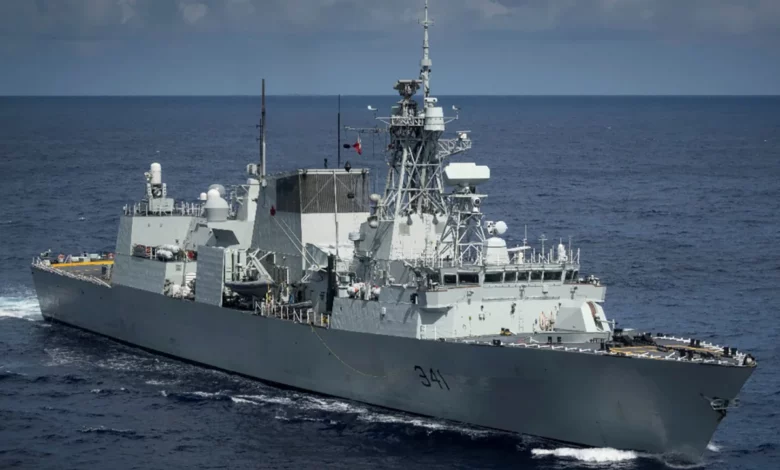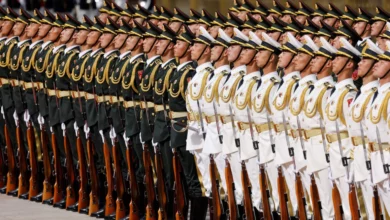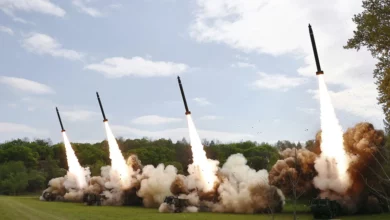
China has accused Canada of carrying out “malicious and provocative” actions in the South China Sea, after the Canadian Navy said Chinese fighter jets endangered a helicopter in two close intercepts above international waters.
The comments come after CNN revealed last week that a Chinese warplane fired flares in front of a Canadian military helicopter on October 29, an operation that Canadian military officers said was reckless and could have resulted in the downing of the aircraft.
The incident was the second of two “unsafe” encounters the Canadian chopper had on that day with Chinese People’s Liberation Army (PLA) Navy J-11 fighters, which got as close as 100 feet (30 meters) from the helicopter, Maj. Rob Millen, air officer aboard the Royal Canadian Navy frigate HMCS Ottawa, told CNN in an interview on the warship.
Canadian Defense Minister Bill Blair briefed reporters on the incidents later Friday, saying the Chinese jets’ actions were deemed to be “significantly unsafe” and put “the safety of all personnel involved in unnecessary risk.”
Canada said both incidents took place in international waters within the South China Sea.
China’s Defense Ministry hit back on Saturday, accusing Canada of violating Chinese and international laws, jeopardizing China’s sovereignty and security, and conducting “malicious and provocative act with ulterior motives.”
Zhang Xiaogang, a spokesperson for the Chinese Defense Ministry, said Canada’s HMCS Ottawa frigate flew two helicopter sorties with “unknown intentions” toward China’s airspace around the Xisha Islands – a disputed archipelago claimed by China, Vietnam and Taiwan and also known as the Paracel Islands.
“China’s People’s Liberation Army organized naval and air forces to conduct identification, verification in accordance with the law and issued multiple warnings. However, the Canadian helicopter not only refused to respond, but also took provocative actions such as flying at ultra-low altitudes,” Zhang said in a statement posted on the ministry’s website.
“We urge the Canadian side not to ignore the facts, stop exaggerating and hyping up (the incident), and to strictly restrict the actions of its frontline naval and air forces to prevent accidents at sea and in the air,” he added.
Millen, the Canadian air commander, told CNN he was piloting the helicopter on October 29, when Chinese J-11s intercepted it at close range while it flew straight and level at 3,000 feet above the water back toward the Ottawa, a signal to the Chinese that it had no hostile intent.
He said he had to descend to 200 feet – an area where the helicopter can operate but is “very uncomfortable for fast air fighter jets” – to end the “unsafe” encounter with Chinese jets.
The Chinese fighters flew in circles so close that his helicopter experienced turbulence coming off the jets, which posed a danger to the copter, Millen said.
China claims historic jurisdiction over almost the entirety of the vast South China Sea, which is a resource rich and vital international shipping route. Since 2014 Beijing has built up tiny reefs and sandbars into artificial islands heavily fortified with missiles, runways and weapons systems – sparking outcry from the other claimants.
In 2016, an international tribunal in The Hague concluded that China has no legal basis to claim historic rights to the bulk of the South China Sea. China has ignored the ruling and Western powers routinely conduct naval passages through the sea to uphold the claim that it is an international waterway.
The latest incidents are the second risky midair intercept Canada has accused China of conducting last month.
In mid-October, a Chinese fighter jet came within 5 meters (16 feet) of a Canadian CP-140 reconnaissance and surveillance plane over the East China Sea.
That incident was recorded by news crews aboard the Canadian aircraft and witnessed by Maj. Gen. Iain Huddleston, the commander of Canada’s 1st Air Division, who was also on the plane.
Huddleston called the intercept “unprofessional” and “very aggressive” in a report from Radio Canada, which was on the plane.
“The Canadian aircraft was subject to multiple close-proximity maneuvers by a PLAAF aircraft that put the safety of all personnel at risk,” Canada’s Defense Ministry said in a statement.
China’s Foreign Ministry said the Canadian plane illegally entered Chinese airspace and accused the Canadian military of sending “warplanes halfway around the world to stir up trouble and make provocations at China’s doorsteps.”




